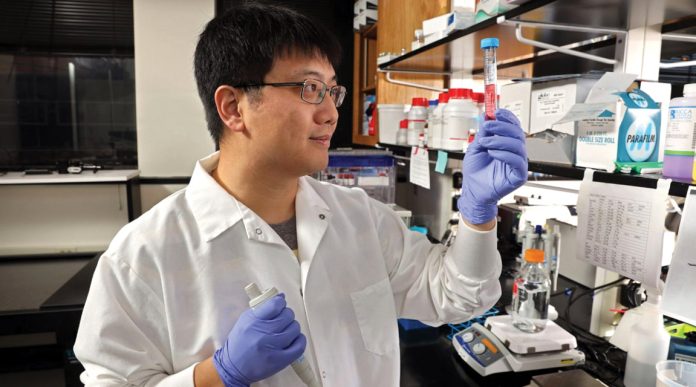The National Institutes of Health has awarded $2.1 million to an Oklahoma Medical Research Foundation scientist for the continued study of lymphatic vessels.
Experiments funded by the five-year grant to vascular biologist Pengchun Yu, Ph.D., will focus on turning on and off the mechanisms that trigger production of these vessels.
Lymphatic vessels form one of the body’s two superhighway systems. Blood vessels transport blood, oxygen and nutrients throughout the body. Lymphatic vessels collect lymph – the fluids that leak from blood vessels – and return it to the bloodstream.
While normally beneficial, lymphatic vessels sometimes sabotage healing. For instance, these vessels contribute to organ rejection after a transplant. The reason: Lymphatic vessels also transport immune cells, and these cells often recognize the donor organ as foreign.
Separately, cancer cells use lymphatic vessels to metastasize or spread to other parts of the body. “That’s why during a breast cancer surgery, surgeons remove lymph nodes to find out how far tumor cells have traveled and to help reduce metastasis by disrupting their highway,” said Yu, who joined OMRF in 2018 from Yale University.
However, removing the lymph nodes can lead to lymphedema, a chronic and potentially dangerous condition marked by painful swelling.
“In that case, when a patient is past the point of the cancer cells spreading, the surgeon would want to reconnect that highway to stop or treat lymphedema,” Yu said. “They need strategies to disrupt and promote the growth of lymphatic vessels, as the situation requires.”
With this new grant, Yu hopes to prove that a specific enzyme is key to producing lymphatic vessels. If correct, this hypothesis could lead to a therapy that inhibits the enzyme and suppresses the creation of these vessels when they might be detrimental. Another potential drug would have the opposite effect by promoting vessel production, he said.
OMRF Cardiovascular Biology Program chair Lijun Xia, M.D., Ph.D., said Yu’s grant represents a critical step toward manipulating the lymphatic system for human health benefits. “Lymphatic vessels influence the health of several organs, but we lack a deep understanding of how they work,” Xia said. “This research could be a major advancement in that effort.”
Yu’s grant, 1R01HL162985-01, is funded by the National Heart, Lung, and Blood Institute, a part of the NIH.















